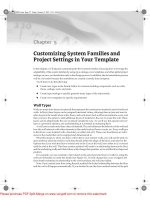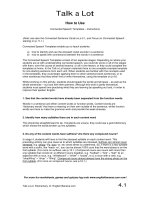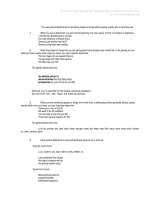Tài liệu Collins cobuild student grammar part 6 doc
Bạn đang xem bản rút gọn của tài liệu. Xem và tải ngay bản đầy đủ của tài liệu tại đây (53.12 KB, 15 trang )
For more material and information, please visit Tai Lieu Du Hoc
at www.tailieuduhoc.org
The nouns often have related verbs that do not take an object.
Helen went upstairs to rest.
I remarked that it would be better if I came.
2 Different verbs are used with different nouns.
You use `have' with nouns referring to:
meals:breakfast dinner drink lunch meal taste tea
talking:chat conversation discussion talk
washing:bath shower wash
relaxation:break holiday rest
disagreement:argument fight quarrel trouble
We usually have lunch at one o'clock.
He was having his first holiday for five years.
3 You use `give' with nouns referring to:
human noises:cry gasp giggle groan laugh scream shout sigh whistle yell
facial expressions:grin smile
hitting:kick punch push slap
talking:advice answer example information interview lecture news report speech talk warning
Mr Sutton gave a shout of triumph.
She gave a long lecture about Roosevelt.
4 You use `make' with nouns referring to:
talking and sounds:comment enquiry noise point promise remark sound speech suggestion
plans:arrangement choice decision plan
travelling:journey tour trip visit
He made the shortest speech I've ever heard.
In 1978 he made his first visit to Australia.
5 You use `take' with these nouns:
careinterestrisk
chanceoffencetime
chargephotographtrouble
decisionresponsibilityturns
He was taking no chances.
She was prepared to take great risks.
6 You use `go' and `come' with `-ing' nouns referring to sports and outdoor activities.
She goes climbing in her holidays.
Every morning, he goes jogging with Tommy.
For more material and information, please visit Tai Lieu Du Hoc
at www.tailieuduhoc.org
Note that you can also use `go for' and `come for' with `a jog', `a run', `a swim', `a walk'.
They went for a run before breakfast.
7 You use `do' with `-ing' nouns referring to jobs connected with the home, and nouns referring generally to work.
He wants to do the cooking.
He does all the shopping and I do the washing.
The man who did the job had ten years' training.
He has to get up early and do a hard day's work.
`Do' is often used instead of more specific verbs. For example, you can say `Have you done your teeth?' instead of `Have
you brushed your teeth?'
Do I need to do my hair?
Unit 57 Auxiliary verbs
Main points
* The auxiliaries `be', `have', and `do' are used in forming tenses, negatives, and questions.
* The auxiliary `be' is used in forming the continuous tenses and the passive.
* The auxiliary `have' is used in forming the perfect tenses.
* The auxiliary `do' is used in making negative and question forms from sentences that have a verb in a simple
tense.
1 The auxiliary verbs are `be', `have', and `do'. They are used with a main verb to form tenses, negatives, and
questions.
He is planning to get married soon.
I haven't seen Peter since last night.
Which doctor do you want to see?
2 `Be' as an auxiliary is used:
* with the `-ing' form of the main verb to form continuous tenses
He is living in Germany.
They were going to phone you.
* with the past participle of the main verb to form the passive
These cars are made in Japan.
The walls of her flat were covered with posters.
3 You use `have' as an auxiliary with the past participle to form the perfect tenses.
I have changed my mind.
I wish you had met Guy.
The present perfect continuous, the past perfect continuous, and the perfect tenses in the passive, are formed using both
`have' and `be'.
He has been working very hard recently.
She did not know how long she had been lying there.
The guest-room window has been mended.
They had been taught by a young teacher.
4
`Be' and `have' are also used as auxiliaries in negative sentences and questions in continuous and perfect
tenses, and in the passive.
He isn't going.
For more material and information, please visit Tai Lieu Du Hoc
at www.tailieuduhoc.org
Hasn't she seen it yet?
Was it written in English?
You use `do' as an auxiliary to make negative and question forms from sentences that have a verb in the present simple
or past simple.
He doesn't think he can come to the party.
Do you like her new haircut?
She didn't buy the house.
Didn't he get the job?
Note that you can use `do' as a main verb with the auxiliary `do'.
He didn't do his homework.
Do they do the work themselves?
You can also use the auxiliary `do' with `have' as a main verb.
He doesn't have any money.
Does anyone have a question?
You only use `do' in affirmative sentences for emphasis or contrast.
I do feel sorry for Roger.
WARNING: You never use the auxiliary `do' with `be' except in the imperative.
Don't be stupid!
Do be a good boy and sit still.
5 Some grammars include modals among the auxiliary verbs. When there is a modal in the verb group, it is
always the first word in the verb group, and comes before the auxiliaries `be' and `have'.
She might be going to Switzerland for Christmas.
I would have liked to have seen her.
Note that you never use the auxiliary `do' with a modal.
See Units 79-91 for more information on modals.
Unit 58 The present tenses
Main points
* There are four present tenses - present simple (`I walk'), present continuous (`I am walking'), present perfect
(`I have walked'), and present perfect continuous (`I have been walking').
* All the present tenses are used to refer to a time which includes the present.
* Present tenses can also be used for predictions made in the present about future events.
1 There are four tenses which begin with a verb in the present tense. They are the present simple, the present
continuous, the present perfect, and the present perfect continuous. These are the present tenses.
2 The present simple and the present continuous are used with reference to present time. If you are talking about
the general present, or about a regular or habitual action, you use the present simple.
George lives in Birmingham.
They often phone my mother in London.
If you are talking about something in the present situation, you use the present continuous.
He's playing tennis at the University.
I'm cooking the dinner.
For more material and information, please visit Tai Lieu Du Hoc
at www.tailieuduhoc.org
The present continuous is often used to refer to a temporary situation.
She's living in a flat at present.
3 You use the present perfect or the present perfect continuous when you are concerned with the present effects
of something which happened at a time in the past, or which started in the past but is still continuing.
Have you seen the film at the Odeon?
We've been waiting here since before two o'clock.
4 If you are talking about something which is scheduled or timetabled to happen in the future, you can use the
present simple tense.
The next train leaves at two fifteen in the morning.
It's Tuesday tomorrow.
5 If you are talking about something which has been arranged for the future, you can use the present continuous.
When you use the present continuous like this, there is nearly always a time adverbial like `tomorrow', `next week', or `later' in the
clause.
We're going on holiday with my parents this year.
The Browns are having a party next week.
6 It is only in the main clauses that the choice of tense can be related to a particular time. In subordinate clauses,
for example in `if'- clauses, time clauses, and defining relative clauses, present tenses often refer to a future time in relation to the
time in the main clause.
You can go at five if you have finished.
Let's have a drink before we start.
We'll save some food for anyone who arrives late.
7 The present simple tense normally has no auxiliary verb, but questions and negative sentences are formed with
the auxiliary `do'.
Do you live round here?
Does your husband do most of the cooking?
They don't often phone during the week.
She doesn't like being late if she can help it.
Unit 59 The past tenses
Main points
* There are four past tenses - past simple (`I walked'), past continuous (`I was walking'), past perfect (`I had
walked'), and past perfect continuous (`I had been walking').
* All the past tenses are used to refer to past time.
* The past tenses are often used as polite forms.
* The past tenses have special meanings in conditional clauses and when referring to imaginary situations.
1 There are four tenses which begin with a verb in the past tense. They are the past simple, the past continuous,
the past perfect, and the past perfect continuous. These are the past tenses. They are used to refer to past time, and also to refer to
imaginary situations, and to express politeness.
2 The past simple and the past continuous are used with reference to past time. You use the past simple for
events which happened in the past.
I woke up early and got out of bed.
If you are talking about the general past, or about regular or habitual actions in the past, you also use the past simple.
She lived just outside London.
For more material and information, please visit Tai Lieu Du Hoc
at www.tailieuduhoc.org
We often saw his dog sitting outside his house.
If you are talking about something which continued to happen before and after a particular time in the past, you use the
past continuous.
They were sitting in the kitchen, when they heard the explosion.
Jack arrived while the children were having their bath.
The past continuous is often used to refer to a temporary situation.
He was working at home at the time.
Bill was using my office until I came back from America.
3 You use the past perfect and past perfect continuous tenses when you are talking about the past and you are
concerned with something which happened at an earlier time, or which had started at an earlier time but was still continuing.
I had heard it was a good film so we decided to go and see it.
It was getting late. I had been waiting there since two o'clock.
4 You sometimes use a past tense rather than a present tense when you want to be more polite. For example, in
the following pairs of sentences, the second one is more polite.
Do you want to see me now?
Did you want to see me now?
I wonder if you can help me.
I was wondering if you could help me.
5 The past tenses have special meanings in conditional clauses and when referring to hypothetical and imaginary
situations, for example after `I wish' or `What if...?'. You use the past simple and past continuous for something that you think is
unlikely to happen.
If they saw the mess, they would be very angry.
We would tell you if we were selling the house.
You use the past perfect and past perfect continuous when you are talking about something which could have happened
in the past, but which did not actually happen.
If I had known that you were coming, I would have told Jim.
They wouldn't have gone to bed if they had been expecting you to arrive.
Unit 60 The continuous tenses
Main points
* Continuous tenses describe actions which continue to happen before and after a particular time.
* Continuous tenses can also indicate duration and change.
1 You use a continuous tense to indicate that an action continues to happen before and after a particular time,
without stopping. You use the present continuous for actions which continue to happen before and after the moment of speaking.
I'm looking at the photographs my brother sent me.
They're having a meeting.
2 When you are talking about two actions in the present tense, you use the present continuous for an action that
continues to happen before and after another action that interrupts it. You use the present simple for the other action.
The phone always rings when I'm having a bath.
Friends always talk to me when I'm trying to study.
3 When you are talking about the past, you use the past continuous for actions that continued to happen before
and after another action, or before and after a particular time. This is often called the `interrupted past'. You use the past simple for
the other action.
He was watching television when the doorbell rang.
It was 6 o'clock. The train was nearing London.
For more material and information, please visit Tai Lieu Du Hoc
at www.tailieuduhoc.org
WARNING: If two things happened one after another, you use two verbs in the past simple tense.
As soon as he saw me, he waved.
4 You can use continuous forms with modals in all their usual meanings.
See Units 79 to 91 for more information on modals.
What could he be thinking of?
They might be telling lies.
5 You use continuous tenses to express duration, when you want to emphasize how long something has been
happening or will happen for.
We had been living in Athens for five years.
They'll be staying with us for a couple of weeks.
He has been building up the business all his life.
By 1992, he will have been working for ten years.
Note that you do not have to use continuous tenses for duration.
We had lived in Africa for five years.
He worked for us for ten years.
6 You use continuous tenses to describe a state or situation that is temporary.
I'm living in London at the moment.
He'll be working nights next week.
She's spending the summer in Europe.
7 You use continuous tenses to show that something is changing, developing, or progressing.
Her English was improving.
The children are growing up quickly.
The video industry has been developing rapidly.
8 As a general rule, verbs which refer to actions that require a deliberate effort can be used in continuous tenses,
verbs which refer to actions that do not require a deliberate effort are not used in continuous tenses.
I think it's going to rain. (`think' = `believe'. Believing does not require deliberate effort)
Please be quiet. I'm thinking . (`think' = `try to solve a problem'. Trying to solve a problem does require deliberate
effort)
However, many verbs are not normally used in the continuous tenses. These include verbs that refer to thinking, liking
and disliking, appearance, possession, and perception.
See Unit 62 for lists of these verbs.
Unit 61 The perfect tenses
Main points
* You use the present perfect (`I have walked') to relate the past to the present.
* You use the past perfect (`I had walked') to talk about a situation that occurred before a particular time in the
past.
1 You use the present perfect tense when you are concerned with the present effects of something which
happened at an indefinite time in the past.
I'm afraid I've forgotten my book.
Have you heard from Jill recently?









